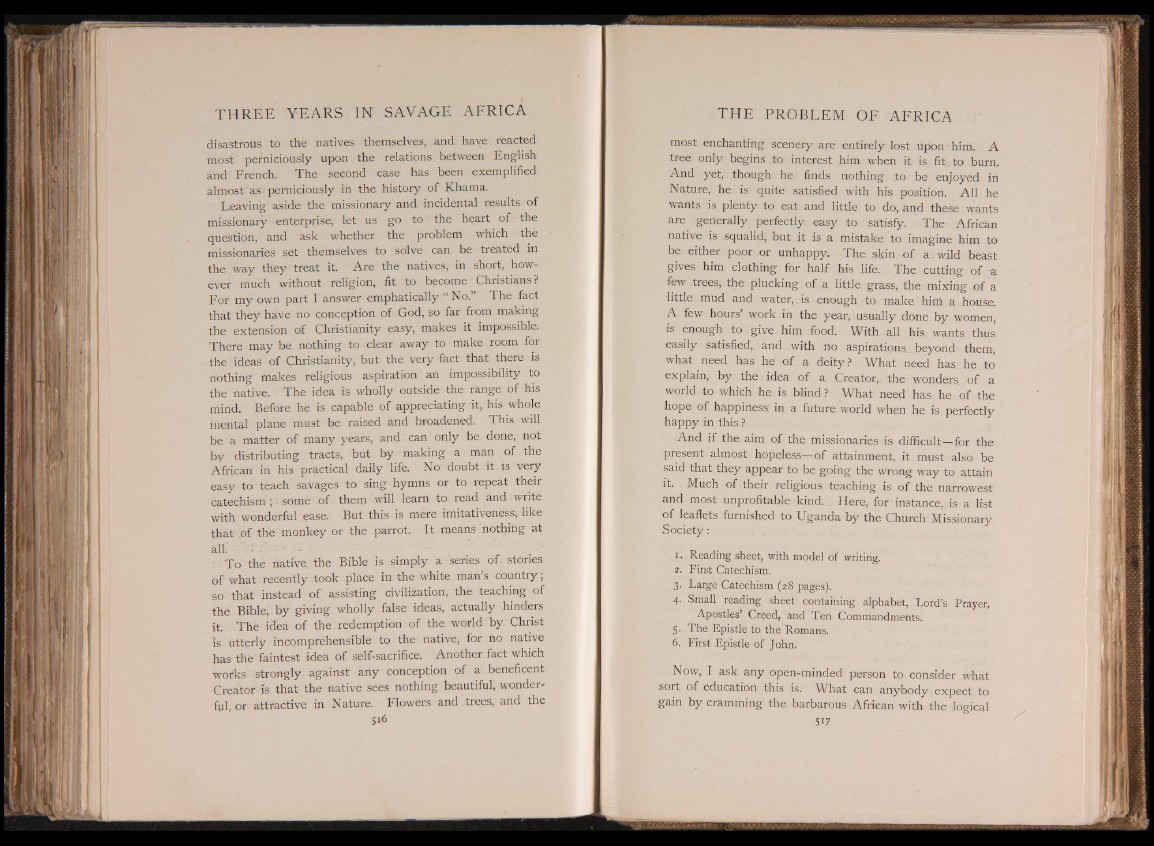
disastrous to the natives themselves, and have, reacted
most perniciously upon the relations between English
and French. The second case has been exemplified
almost as- perniciously in the history of Khama.
Leaving aside the missionary and incidental results of
missionary enterprise^, let us go to : the heart of the
question, and ask whether the problem which the
missionaries set themselves to solve can be treated in
the way they treat it. Are the natives, in short, how-,
ever much without religion, fit to become Christians?
For my own part I answer emphatically “ No. The fact
that they have no conception of .God, so far from making
the extension of Christianity easy, makes it impossible.
There may be nothing to clear away to make room for
the ideas of Christianity, but the very fact that there is
nothing makes religious aspiration an impossibility to
the native. The idea is wholly outside the range of his
mind. Before he is capable of appreciating it, his whole
mental plane must be raised and broadened. This will
be a matter of many years, and can only be done, not
by distributing tracts, but by making a man of the
African in his practical daily life. No'doubt it is very
easy to teach savages to sing hymns or to repeat their
catechism ; some. c>f them will learn to read and write
with wonderful ease. But this is mère imitativenéss,. like
that .of the monkey or the parrot. It means nothing at
J j • : I - -
To thè native the Bible is simply a series of; stories
bf what recently took place in the white mans country,
so that instead of assisting civilization, the teaching of
the Bible, by giving wholly false ideas, actually hinders
it. The idea of the redemption of the.world by. Christ
is utterly incomprehensible to the native, for ño native
has ther faintest idea of self-sacrifice. Another fact which
works strongly against any'conception of a beneficent
Creator is that the native sees, nothing beautiful, wonderful,
or attractive in Nature. Flowers and .trees, and the
516
most enchanting scenery are entirely lost upon -him. A
tree only begins to. interest him when it is fit., to burn.
And yet, though he finds nothing .to be enjoyed in
Nature, he is quite satisfied with his position. All he
wants is plenty to eat and little to do, and these wants
are generally perfectly easy to satisfy. The African
native is squalid, but it is a mistake to imagine him to
be either popr or unhappy. The skin of a > wild beast
gives him clothing for half his life. The cutting of a
few trees, the plucking:of a little grass, the mixing of a
little mud and water, , is enough to make him a house.
A few hours’ work in the year, usually done by women,
is enough to give him food. With all his wants thus
easily satisfied, and with no aspirations., beyond them,
what need has he of a deity ? What need has he to
explain, by the idea of a Creator, the wonders, of a
world to which he.is blind? What need has he of the
hope of happiness: in a future world when he is perfectly
happy in this ?
And if the aim of the missionaries is difficult—for the
present almost hopeless—of attainment, it must also be
said that they appear to be going the wrong way to attain
it. Much of their religious teaching is of the narrowest
and most unprofitable kind. Here, for instance, is a list
of leaflets furnished to Uganda by the Church Missionary
Society:
1. Reading sheet, with model o f writing.
2. First Catechism.
3. Large Catechism (28 pages).
4. Small reading sheet containing alphabet, L ord ’s Prayer,
Apostles’ Creed, and T en Commandments.
5. Th e Epistle to the Romans.
6. First Epistle o f John.
Now, I ask any open-minded person to consider what
sort of education this is. What can anybody expect to
gain by cramming the barbarous African with the logical
Si7